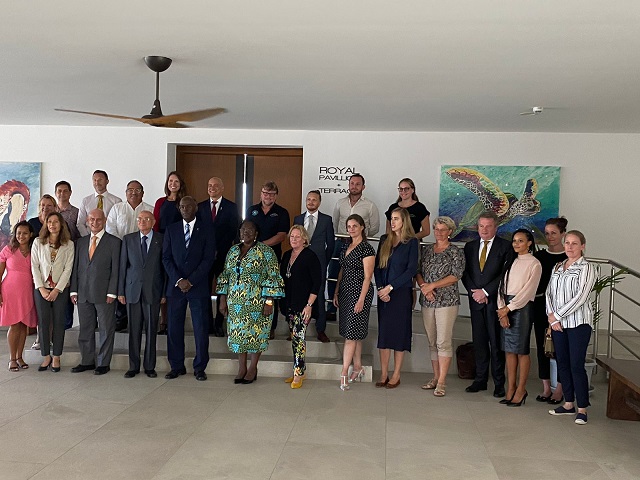
From big litigation to renovations for their new sea lab, 2022 promises to be a banner year for the Saba Conservation Foundation (SCF). SCF recently presented at the Dutch Caribbean Nature Alliance (DCNA) Board Meeting, highlighting exciting new projects on the horizon.
Just over five years ago, a 48 meter super yacht, Elsa, broke loose of her mooring and ran ashore, leading to several thousand liters diesel fuel spilling into the sea. SCF with assistance from DCNA completed an environmental impact assessment (EIA), showing minor damage to the marine habitat. A second EIA was commissioned by the insurance company, where they also found no notable evidence to claim compensation for marine damage. Nonetheless, after a lengthy legal battle by the vessel’s owner, John Deuss of Elsa Shipping, against the State, Island Government and SCF , the court eventually decided in favor of the island and refuted all claims by the opponent. However, Elsa Shipping appealed the ruling and the court case went into second instance and proceedings are still ongoing. Important lessons have been learned from the unfortunate incident and the SCF is now much better prepared to respond to such situations in the future, with the ultimate goal to protect the coastal resources of Saba.
Key Projects
Successes go beyond the courtroom, however, with a number of other key projects meeting important milestones. SCF executed an important bird monitoring program to track the local populations of tropicbirds. SCF also attended the Land Bird Monitoring Workshop in the Dominica Republic to help shape future bird projects for the island. In addition, coral mapping at the proposed harbor construction site was completed with a follow-on coral relocation trial.
Much progress has been made with the establishment of an ethno botanical garden at the SCF Trail Shop property in Windwardside. The garden will not only act as an educational center for the foundation’s after school programs and become a new tourist attraction, displaying indigenous local flora, but also serve as the focal point for the upcoming reforestation project, that will be initiated in mid 2022.
In an effort to further increase local coral reefs, important coral nurseries were established, which included the deployment of 95 artificial reef “Moreef” balls that boost a 95% coral survival rate. Paired with a successful phase 1 of the Diadema project, which spawned nearly 400 long-spined black urchins in their nursery, the future for coral reef restoration is off to a promising start. Renovations to build the new Saba Sea Lab at the old power plant have also started, which will help elevate these projects and build capacity on island for future endeavors.
Financial Gaps
Growth is not without limitations, however, as SCF stressed the potential financial shortfalls in the upcoming years. Although the Nature and Environmental Policy Plan (NEPP) for the BES islands slated exciting new projects to dramatically improve the state of nature, this plan requires proper funding and an increase in capacity to manage and execute these projects. Assuming a baseline revenue of 2018, SCF estimates a financial gap of nearly US$880,000 per year, thus creative and sustainable solutions are needed immediately.
There is also a need for additional external staff to complete reforestation projects, invasive species monitoring, removal of free roaming grazers, management of beach enhancements, monitoring sea water quality, keystone and flagship species enforcement not to mention capital investments for facilities for waste vessel discharge. Although Saba’s future looks auspicious, without serious and sustainable investments the island will fall short of the visions laid out in the NEPP.
Working Together
The DCNA board meeting is an important opportunity for each of the Protected Area Management Organizations in the Dutch Caribbean- – the Aruba National Parks Foundation (FPNA), STINAPA Bonaire, CARMABI Curaçao , Saba Conservation Foundation (SCF), Nature Foundation St. Maarten (NFSXM), St. Eustatius National Parks (STENAPA) – to collaborate, share resources and exchange information and ideas. Working together, each island can learn from the others, maximizing their successes and learning from the more challenging experiences.




























